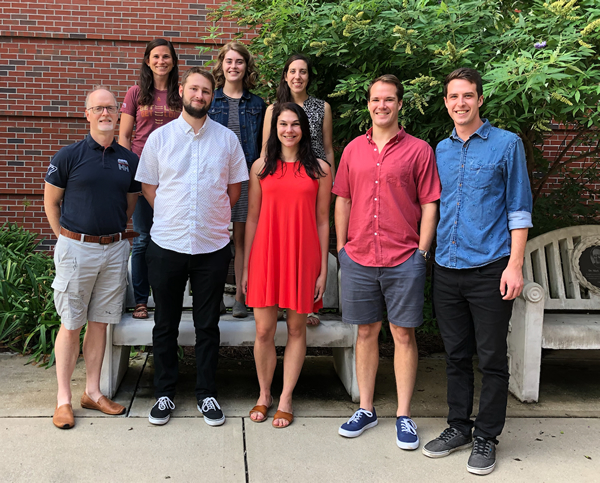Find a CBT Therapist
Search through our directory of local clinicians.
The Anxiety and Behavioral Health Clinic (ABHC) and Research Laboratory, located at the Florida State University Department of Psychology
Featured Lab
N. Brad Schmidt, Ph.D.
Norman B. (Brad) Schmidt, Ph.D. is Distinguished Research Professor in the Department of Psychology at the Florida State University. He also directs the Anxiety and Behavioral Health Clinic, a clinical research center focused on the development and evaluation of state-of-the-art treatments for anxiety-related problems. His research focuses on the nature, causes, treatment, and prevention of anxiety psychopathology as well as related conditions such as substance use, mood disorders, and suicide. He has published approximately 500 peer-reviewed publications. He is a Fellow of the American Psychological Association (APA), the Association for Psychological Science (APS) and the Association for Behavioral and Cognitive Therapies (ABCT).
The Anxiety and Behavioral Health Clinic (ABHC) is both a research lab and a training clinic. As such, the ABHC serves as a recruitment vehicle for research studies, a training clinic for graduate students to refine their skills in treating those with anxiety psychopathology, and a resource for those in the community in need of services. We have a great group of ABHC alumni who have gone on to successful careers in psychology, including academic psychology departments, the VA, teaching colleges, and other opportunities in the field.
How long have you been a member of ABCT?
I joined ABCT as a graduate student (when it was AABT), so it’s been over 30 years I believe. I was elected an ABCT Fellow in 2015.
How often and why do you attend the ABCT convention?
Our group goes every year. For me, it’s a great time to catch up with colleagues and FSU/lab grads.
How do you stay current with developments in the field, both research and practice?
I review a lot of grants and manuscripts, and my grad students help because they are involved in a pretty diverse array of topics.
How has ABCT helped you/your lab professionally?
ABCT was integral in providing a meeting place for me to get to know so many leaders in the field – really too many to list. It’s also been pivotal in the development of collaborative opportunities.
Does your lab have any traditions? Does your lab do anything together for fun?
Not exactly a tradition, but we go over convention talks as well as thesis and dissertation presentations where everyone gets some “tough love.” We try to do a lab happy hour every semester as well as have gathers to celebrate folks moving on to bigger and better things (e.g., internship).
What advice would you give prospective trainees?
Try to get experience that’s relevant to the lab(s) you are applying to make yourself a great match for those places.
Doctoral Student Lab Members
We asked each of the ABHC Lab’s ABCT student members:
- What is your area of research interest?
- How has ABCT been helpful to you?
- If a student were thinking about joining ABCT, what activities would you recommend they get involved in?
Brittany Mathes, M.S.
- I am interested in obsessive-compulsive and related disorders.
- ABCT has helped me to build and maintain professional relationships with individuals in my area of research.
- I definitely recommend attending and presenting at the convention.
Alex Martin, B.S.
- I am interested in obsessive-compulsive and related disorders.
- ABCT has provided me with a platform to disseminate my research.
- I certainly recommend presenting at the convention.
Danielle Morabito, B.A.
- I am interested in trauma and related psychopathology.
- ABCT has helped me gain knowledge and stay up to date on a wide variety of translational and treatment-oriented research as well as clinical techniques. Participating in the ABCT convention has allowed me to reconnect with past colleagues and inspired me to think of new, innovative research ideas.
- I would highly recommend attending and presenting at ABCT conventions. Additionally, getting involved and/or attending events hosted by the Student SIG can be very helpful.
Thomas J. Preston, B.S.
- I am interested in researching how symptoms of PTSD relate to substance abuse; specifically, through the identification of neural mechanisms that influence in this relationship.
- ABCT allows me to present my research to other individuals with similar interests, helping me to network and broaden my knowledge of other research within the field.
- I recommend presenting posters at your university and at ABCT conventions; the best way to do this is to develop an idea that may be worth examining and to talk about it with your supervising graduate student or lab director.
AHBC’s Student Lab Members
Graduate Students
Brian Albanese, MS
Joseph Boffa, MS
Brittany Mathes, MS
Karl Wissemann, BA
Danielle Morabito, BA
Carter Bedford, BA
Alex Martin, BS
Postbaccalaureate RA
Thomas Preston, BS
Lab Volunteers
Katherine Garcia, BS
Julia Gorday, BS
Undergraduate Students
Evan Albury
Amelia Blanton
Kylie Cash
Jennifer Cott
Ashley Crisafulli
Alexis Daniels
Lora Eddy
Madeline Gore
Zig Hinds
Kate Kulyk
Monica Lopez
Cameron Matoska
Martin McCollum
Raina Novelli-Miller
Emma Padgett
Aimee Rolle
Daniela Sanchez
Jenna Van Sciver
Nicholas Vazquez
Savannah Woller
Renee Wyatt
Christopher Zappi

